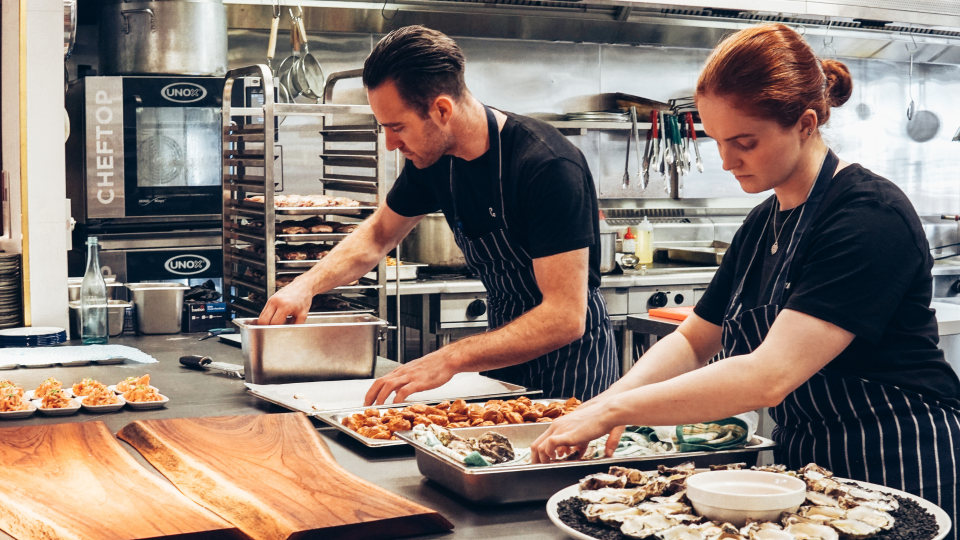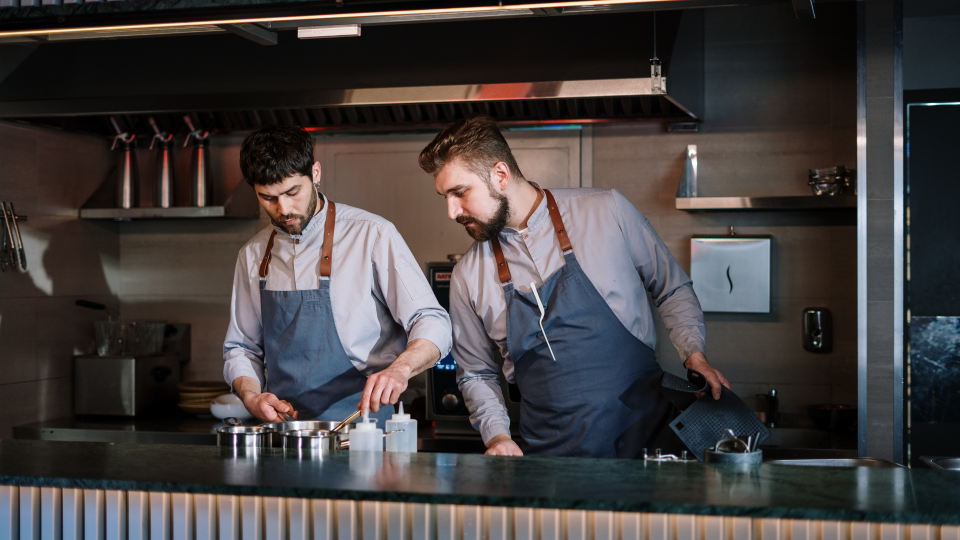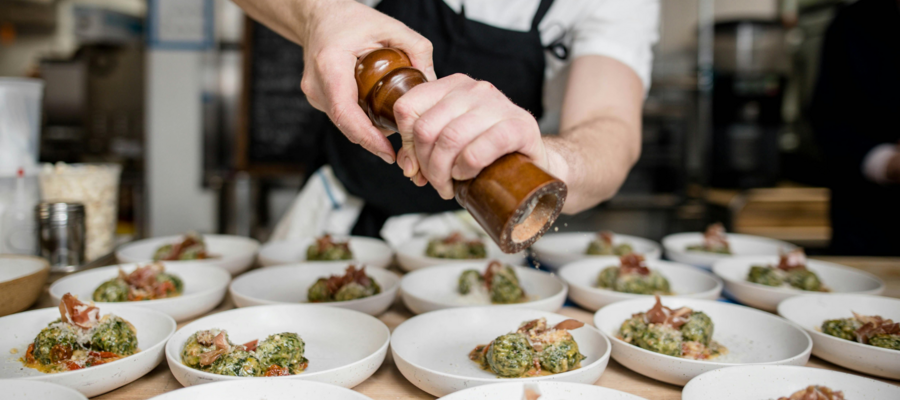Picture this: Monday you're plating delicate amuse-bouches in an upmarket restaurant, Wednesday you're managing a hectic pub lunch rush, and Friday you're preparing canapés for a black-tie corporate event. Welcome to the world of agency chef work – where no two days are ever the same.
Agency chefs work temporary positions through recruitment agencies, stepping into kitchens that need skilled hands at short notice. Whether it's covering staff holidays, handling busy periods, or filling unexpected gaps, these culinary professionals bring expertise exactly when and where it's needed most. But what's it really like behind the scenes?
As someone that has lived this life myself before stepping into recruitment, I've seen the industry from both sides, giving me a unique perspective on exactly what it takes to succeed as an agency chef.
In this blog post I’ll cover what it truly takes to thrive in this demanding but flexible career path.
What Does an Agency Chef Actually Do?
The heart of agency chef work remains the same as any chef role – creating great food. You'll handle everything from menu planning and prep work to cooking and plating dishes to restaurant standards. Food safety and hygiene are absolutely non-negotiable, and you'll need to maintain these standards wherever you work.
Where things get interesting is the sheer variety of environments you'll encounter. One week you might find yourself in a bustling gastropub kitchen during Sunday lunch service, the next in a quiet care home preparing nutritious meals for residents. I've spoken with agency chefs who've worked everywhere from exclusive private dining venues to busy hospital kitchens – each with their own unique rhythm and challenges.
The key skill that separates successful agency chefs from the rest is adaptability. You need to walk into an unfamiliar kitchen and hit the ground running. That means quickly learning where everything is kept, understanding the menu, and working out how the team operates – all while maintaining your professional standards from day one.

How Does Agency Chef Work Actually Function?
Getting started as an agency chef involves a proper vetting process. You'll need to register with a reputable agency, providing your CV along with essential qualifications like a valid Level 2 Food Hygiene Certificate and Allergen Certificate. Here at Select we’ll also interview you upon registration to get a better idea of your skill set and what kind of work suits you.
Once you're registered, you become part of a three-way relationship between yourself, the agency, and client kitchens. The agency handles all the admin – finding you work, confirming shifts, and dealing with payments. This frees you up to focus entirely on what you do best: cooking.
The Money Question: What Do Agency Chefs Actually Earn?
Let's talk numbers, because this is probably what you're most curious about. Agency chefs often earn more per hour than their permanently employed counterparts – and there's a good reason for this.
The UK has a serious chef shortage, which means establishments are willing to pay premium rates for skilled temporary staff. Agencies pass this premium on to you, compensating for the fact that you don't have guaranteed hours.
Current rates vary by experience level. Chef de Partie positions can range from around £15 to £20 per hour. Sous Chef rates usually range from £20-24 per hour, and Head Chef positions command £25 per hour or more. Specialist roles or those requiring unique skills can push these rates even higher.
To put this in perspective, a Chef de Partie earning £17 per hour through agency work would need a permanent salary of around £35,000 to match that hourly rate – a lot more than most permanent Chef de Partie positions actually offer.
A Day in the Life: What Agency Work Really Feels Like
No sugar-coating here – agency chef work can be intense. You might arrive to find equipment you've never used before, a menu you've never cooked, or a kitchen layout that makes no logical sense. That's part of the territory.
During my time as an agency chef I’ve faced some challenging situations: turning up to find the main oven broken, having to improvise with limited ingredients, or discovering the knife set consists of one blunt blade and a lot of optimism.
These scenarios aren't daily occurrences, but they can happen, and you need to be someone who thrives on problem-solving rather than panics when things don't go to plan.
On the other hand, when everything clicks – when you nail a new menu, win over a skeptical kitchen team, or pull off a flawless service in challenging circumstances – the satisfaction is immense. You know you've earned your reputation the hard way.
Building relationships quickly is part of the skill set. You might only be in a kitchen for one shift, but you still need to work seamlessly with the team. The best agency chefs I've worked with are those who can read a room, adapt their communication style, and become a valuable team member within hours rather than days.
The Real Benefits of Agency Chef Work
The biggest draw for most agency chefs is flexibility. Unlike permanent roles with rigid schedules and mandatory overtime, you can choose when you work. Want to take a long weekend? Turn down Friday and Monday shifts. Need time off for a family event? You're not asking permission from a boss – you're simply not available.
This flexibility extends beyond just time off. You can be selective about the types of work you accept. Prefer fine dining to casual restaurants? You can focus on upmarket establishments. Enjoy the energy of busy gastropubs? You can specialise in that sector. The choice is genuinely yours.
The learning opportunities with an agency are also accelerated, compared to permanent roles. In a permanent job, you might spend years mastering one style of cuisine or working with the same equipment. As an agency chef, you could experience five different cooking styles in a month, work with equipment you'd never encounter otherwise, and pick up techniques from chefs across the industry.
Networking happens naturally when you're constantly meeting new people. I've worked with agency chefs who have landed dream permanent positions simply because they impressed someone during a temporary assignment. Others have built substantial client bases for private work through connections made during agency shifts.
There's also the psychological benefit of avoiding workplace politics. Every kitchen has its dramas and personality clashes, but as an agency chef, you're largely insulated from these issues. You do your job well and move on – it's refreshingly straightforward.

The Challenges You Need to Consider
Agency work isn't for everyone, and it's important to understand the downsides before diving in. The most obvious challenge is income variability. Unlike a permanent salary that arrives predictably each month, agency income fluctuates based on how much work is available and how much you choose to take on.
This variability requires disciplined financial management. You need to budget for quieter periods and build up savings during busy times. Some agency chefs find this uncertainty stressful, particularly if they have significant financial commitments like mortgages or family expenses.
The constant adaptation can also be mentally and physically draining. Always being the "new person" requires energy, and constantly proving yourself in different environments can be exhausting. Some chefs thrive on this challenge, while others find it overwhelming.
Your reputation becomes everything in agency work. In a permanent job, one bad day might be forgotten within a week. As an agency chef, a poor performance can damage your relationship with both the agency and the client, potentially costing you future work. The pressure to perform consistently at a high level is real and constant.
Career Progression and Future Opportunities
Many people assume agency work is a career dead-end, but that's far from true. The experience and connections you build can actually accelerate career progression in several ways.
Temp-to-perm opportunities are common. Many of my clients use agency placements as extended interviews, allowing both parties to assess whether a permanent arrangement would work. It's a "try before you buy" approach that often leads to better long-term matches than traditional recruitment processes.
The diverse experience you gain makes your CV incredibly attractive to permanent employers. A chef who's worked across multiple establishments, mastered different cuisines, and adapted to various kitchen environments brings a breadth of experience that permanently employed chefs simply can't match.
Some agency chefs eventually transition to fully freelance private chef work, using the network and experience they've built to establish their own client base. The earning potential in private work can be substantial, particularly if you develop relationships with high-net-worth clients or corporate accounts.
Getting Started: Your Path to Agency Chef Work
If agency work sounds appealing, here's how to get started. You'll typically need a good basis of professional kitchen experience – agencies want chefs who can handle pressure and work independently from day one. Your Level 2 Food Hygiene Certificate must be current, and some clients also require an Allergen Certificate or a DBS.
Professional appearance matters more in agency work than you might expect. You're representing both yourself and the agency, so invest in quality chef whites and maintain a professional knife set. First impressions count when you're constantly meeting new people.
Building your reputation starts with your very first shift. Arrive early, work cleanly, communicate clearly, and always leave the kitchen in better condition than you found it. Word travels fast in the hospitality industry, and a reputation for reliability and professionalism will lead to better assignments and higher rates.
Is Agency Chef Work Right for You?
Agency chef work offers genuine benefits – flexibility, higher hourly rates, accelerated learning, and freedom from office politics. But it also demands adaptability, financial discipline, and the ability to perform consistently under pressure.
The chefs who thrive in agency work tend to be confident professionals who enjoy variety and challenge. If you're someone who gets energised by new environments and takes pride in proving yourself repeatedly, agency work could be perfect for your career goals.
Whether you're looking to supplement your income with flexible shifts or considering a complete career change, the right recruitment agency can help you explore opportunities that match your skills and ambitions. If you'd like to discuss how agency chef work might fit your career plans, we're here to help you take the next step.
If working as an agency chef seem like something you’d like to explore, reach out to me on 01603 331118 or s.redmond@select.co.uk for a confidential chat about getting started.
Author:




